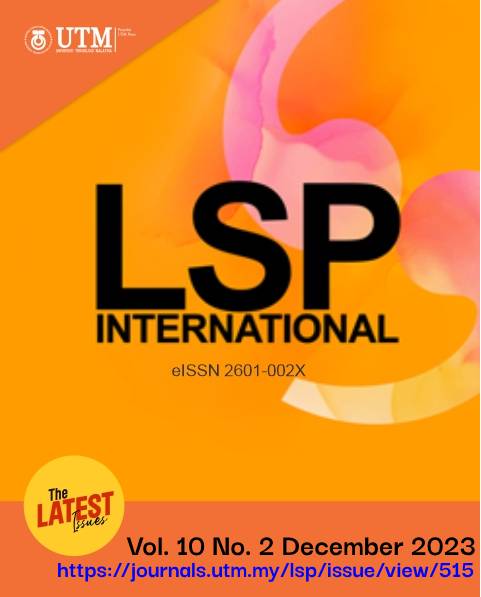Focus Group Discussion on Students’ Perception of Gamification in Learning Cohesion in Arabic
DOI:
https://doi.org/10.11113/lspi.v10.21429Keywords:
Focus Group Discussion, Students’ perception, Gamification, Cohesion in ArabicAbstract
Learning languages had been taught as a passive process. But in this era of Information and Communication Technology, a lot of educators use the technology provided on the Internet to attract students to focus on learning. Nowadays, gamification is widely used by educators while teaching online including Arabic language. Thus, this study aims to identify the students’ perception on gamification in learning Arabic cohesive devices. This study employed qualitative approach which the researchers used focus group discussion as a mode of data collection. The sampling method used is convenience sampling which all of them are students at Universiti Sains Islam Malaysia (USIM), 2nd year students, semester 2, 2018/2019 taking Arabic subject. In this study, researchers managed to recruit 14 participants for 3 focus group discussion whereby 5 participants respectively in the first group and 4 participants in another group. From the result of the research, the process of learning Arabic cohesive devices in the Arabic language takes place with all enjoyment which increases the students’ interest for learning.
References
Abdullah, F., Abdul Razak, K. (2021). tahap minat dan penerimaan pelajar terhadap gamifikasi dalam bidang Sirah (Level of interest and acceptance of students towards gamification in Islamic history). Journal of Quran Sunnah Education and Special Needs, 16(1), 27-38.
Halliday, M. A. K. & Hasan, R. (1976). Cohesion in English. Longman.
--------- (1985). Language, context and text: Aspects of language in a social-semiotic perspective. Deakin University Press.
Hussain, S. Y. S., Tan, W. H., & Idris, M. Z. (2014). Digital game-based learning for remedial mathematics students: A new teaching and learning approach in Malaysia. International Journal of Multimedia Ubiquitous Engineering, 9(11), 325-338.
Johari, H. & Fazliana, R. (2012). Penggunaan ICT dalam proses pengajaran dan pembelajaran di kalangan pengajar fakulti pengajaran Universiti Teknologi Malaysia Skudai, Johor.
Kiryakova, G., Angelova, N. & Yordanova, L. (2014). Gamification in education. Proceedings of 9th International Balkan Education and Science Conference.
Nurul Ain Azmi, Razzatul Iza Zurita Rasalli & Norazila Aniah. (2018). Penggunaan aplikasi Kahoot dalam pembelajaran modul teori di Kolej Komuniti Ledang Johor. International Conference on Education, Islamic Studies & Social Sciences Research (ICEISR).
Nor Zainiyah Norita Mokhtar, Nurul Hanilah Binti Mohd Ismath. (2020). Focus group discussion and interview: Some basic guidelines enriching the Islamic Tradition in research inquiry. Kuala Lumpur: International Institute of Islamic Thought (East and Southeast Asia Office).
Rahimah Wahid. (2019). Kaedah gamifikasi sebagai alternatif pengajaran dan pembelajaran dalam kursus berkaitan alam sekitar . Journal of Education and Social Sciences, 12(2), 50-53.
Rosmaza Sukardi, Harun Baharudin, Maimun Aqsha Lubis. (2016). Konsep gamification sebagai kaedah meningkatkan motivasi dalam pembelajaran bahasa Arab di Malaysia, Kolokium Pendidikan Bahasa Arab 2016 (Kobar 16) 10 Desember 2016: 128-135.
Siti Norhaida Binti Abdul Rahman. (2017). Pendekatan Gamifikasi dalam pengajaran dan pembelajaran terhadap murid tingkatan dua bagi topik Ungkapan Algebra. Tesis Sarjana, Universiti Tun Hussein Onn Malaysia.
Sibawayh. (1974). Al-Kitab. Al-Hayah Al-Misriyyah Al-Ammah lilkitab.
Suzana, S. & Fariza, K. (2014). Pengajaran dan pembelajaran menggunakan perisian Google - Satu analisis kajian lepas. Pengajaran Sumber dan Teknologi Maklumat: Impaknya ke atas Penyelidikan dalam Pendidikan. 1, 25-32.
Siti Rohani binti Jasni, Suhaila binti Zailani & Hakim bin Zainal. (2019). Pendekatan gamifikasi dalam pembelajaran bahasa Arab. Jurnal Pengurusan dan Penyelidikan Fatwa. SeFPIA 2018, Special Edition, 358-367.
















